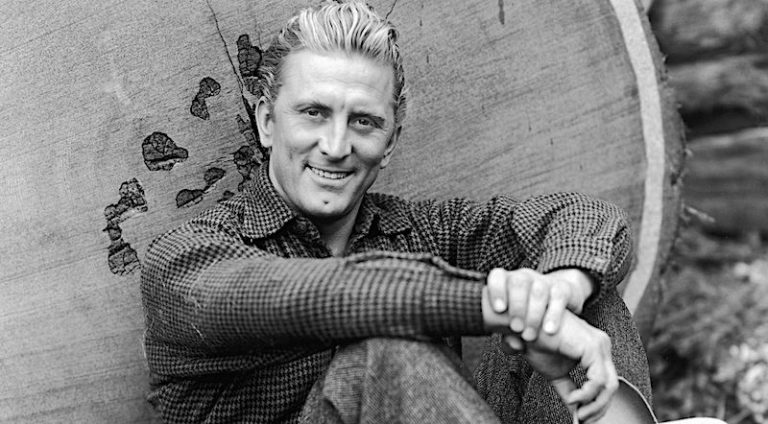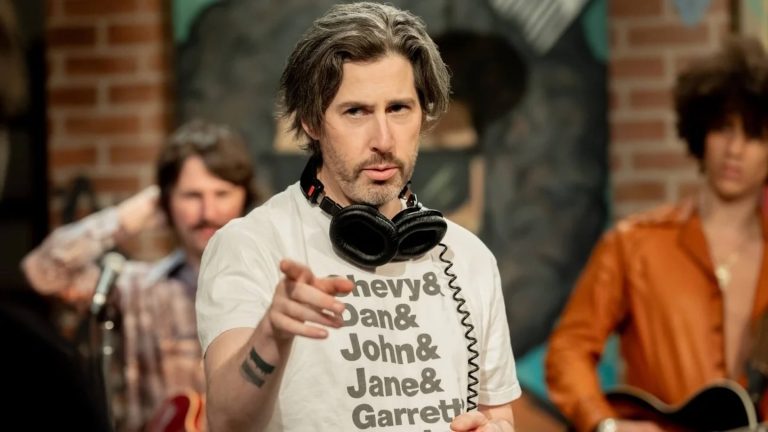
What inspiring quotes from late, great screen icon Kirk Douglas can screenwriters use in their screenwriting journeys?
Actor, producer, and philanthropist Kirk Douglas passed away Wednesday, February 5th, 2020 after a long life as one of this generation's greatest actors and stars.
Born as Issur Danielovitch on December 9, 1916, in Amsterdam, New York, Douglas was the only boy among six sisters, all raised by Russian Jewish immigrants that moved to the United States for a better life.
Throughout his youth, he took on a variety of odd jobs to help the large family make ends meet.
Douglas began acting in high school plays and excelled in both sports and academics — later attending St. Lawrence University in upstate New York.
After he graduated, Douglas attended the American Academy of Dramatic Arts in New York City. After World War II broke out, he joined the US Navy, receiving an honorable discharge in 1944.
He married fellow actress Diana Dill, and the couple subsequently had two sons — Michael, born in 1944, and Joel, born in 1947. Douglas and Dill later divorced in 1951.
After the war, he started acting on the New York stage and radio.
In 1946, Kirk was cast in the Barbara Stanwyck film The Strange Love of Martha Ivers. The film launched his Hollywood career.
Douglas then acted in two film classics — 1947's film noir Out of the Past and 1949's A Letter to Three Wives.
In 1948, he also appeared with Burt Lancaster in I Walk Alone, beginning a seven-film collaboration with films that included Gunfight at the O.K. Corral (1957) and the political thriller Seven Days in May (1964).
Douglas became a star and garnered his first Academy Award nomination for 1949's boxing classic Champion.

His next starring role was in then 1950's Young Man with a Horn, playing opposite Doris Day.
In 1951, Billy Wilder cast him in Ace in the Hole, a film that failed at the box office but aged well, now thought of as one of their best. Many films followed, including one where he received his second Oscar nomination as the villainous film producer in The Bad and the Beautiful, opposite Lana Turner.

While acting in the European film Act of Love (1953), Douglas married the film's publicist, German-born Belgian Anne Buydens. The new couple produced two sons, Peter and Eric. Kirk and Anne's marriage was notable for its longevity— they celebrated a second "recommitment" ceremony on their 50th wedding anniversary.
Shortly after their marriage, Kirk starred in one of his most iconic movies as a sailor in the hit Disney live-action version of Jules Verne's 20,000 Leagues Under the Sea.

He received his third Oscar nomination as Vincent Van Gogh in 1956's Lust for Life.

In 1955, Douglas formed The Bryna Company. At the time, actors having their own production company was unheard of.
They produced the critical hit Paths of Glory, 1957's classic World War I anti-war drama directed by Stanley Kubrick. Douglas starred as Colonel Dax, a French commander who faces a life-defining moral dilemma.

The next year, he starred in the box office hit The Vikings.

In 1960, Douglas's company produced Spartacus, reuniting Stanley Kubrick and Kirk Douglas. A notable historical note with this film touches on the Hollywood era's blacklisting of artists. Douglas insisted formerly blacklisted screenwriter Dalton Trumbo be credited under his own name. This ended the McCarthy-era blacklist, which Douglas regards as the high point of his career.

Trumbo worked with Douglas again in 1962's Lonely Are the Brave, one of Douglas's favorite roles.
That next year, he began taking a series of international trips as a goodwill ambassador for the US State Department. He and his wife established The Douglas Foundation in 1964, which would go on to be one of the entertainment industry's oldest and largest private philanthropic organizations, focusing on health, education, and the disadvantaged.
Douglas later starred as Randall McMurphy in a New York stage adaptation of the Ken Kesey novel One Flew Over the Cuckoo's Nest. He gave the motion picture rights of the novel to his son Michael, who went on to produce a film version with Jack Nicholson in the McMurphy role. The film dominated the Academy Awards in 1975.
Douglas appeared in many films throughout the 1960s and 1970s, including The List of Adrian Messenger (1963), In Harm's Way (1965), Is Paris Burning? (1966), The Arrangement (1969), Once Is Not Enough (1975), and The Fury (1978), directed by Brian De Palma.
1980 brought the science-fiction time-travel classic The Final Countdown — produced by his Douglas's son Peter. In 1982, he traveled to Australia to star in The Man from Snowy River.
Douglas began to star in feature-length television films later in the 1980s.
He then turned to writing with his autobiography The Ragman's Son and novels such as Dance With the Devil and Last Tango in Brooklyn. He also delved into non-fiction books like Climbing the Mountain: My Search for Meaning, My Stroke of Luck, and I Am Spartacus!. In 2014, he published his first book of poetry, Life Could Be Verse.
Douglas accepted the American Film Institute's Life Achievement Award in 1991, and they also placed him on its list of the top fifty stars of American cinema. In 1996, he won an Honorary Academy Award "for fifty years as a creative and moral force in the motion picture community."
Back in 1981, he was honored with the Presidential Medal of Honor — the United States' highest civilian award — recognizing his work as a goodwill ambassador for the U.S. State Department. The French government later presented him with the Legion of Honor in 1985. And in 2001, Douglas received the National Medal of the Arts at the Kennedy Center in Washington, D.C.
Needless to say, his long life and career led to many achievements, accolades, and a legacy that will live on for generations. Here we take some of his most wise and inspiring words and apply them to the screenwriting journey, with our own elaboration.
"The learning process continues until the day you die."
You never stop learning as a screenwriter. You never reach some mystical level of understanding the art and craft of screenwriting.
You learn with every screenplay. And just when you think you can't learn anymore, you fail, and then later learn from those failures.
Aaron Sorkin is still learning about screenwriting — as are most of the greats. Quentin Tarantino seemingly peaked with his first few screenplays (Natural Born Killers, True Romance, Reservoir Dogs, and Pulp Fiction). The few films that followed were primarily genre homages until he shifted into high gear with scripts like Inglorious Basterds, Django Unchained, The Hateful Eight, and Once Upon a Time in Hollywood.
You will always be learning as a screenwriter. And if you're not — or if you don't believe that you have anything more to learn — it's time to wake up and understand that you're still a student of the art and craft of screenwriting. Challenge yourself and learn some more lessons. That's how you become great.
"You know, you have to have some inner philosophy to deal with adversity."
Screenwriters deal with more adversity than most in Hollywood. The rejection is seemingly unending — even when you've gotten to a stage where you're finally writing great scripts worthy of notice.
To deal with this non-stop adversity, you need to go about things with a good philosophy. Some helpful hints as to what that philosophy should encompass include:
- Rejection is inevitable. Embrace it. Learn from it.
- Not getting your scripts read is part of Hollywood's filtration process. Keep trying, and you'll sneak your way through that filter if the writing is worthy.
- Years of effort do not entitle you to anything. The writing has to be great. And for it to be great, you have to write a lot of scripts, learn from their failures, and write some more.
"No matter how bad things are, they can always be worse."
Don't wallow in self-pity when things aren't going right. Stay positive and understand that things can always be worse.
Be thankful for the successes — big or small — that you've had. Learn from the failure and rejection you've experienced. And never choose the path of becoming a negative and cynical screenwriter, always pointing fingers at Hollywood and blaming them for your problems.
If the writing is excellent, it will eventually get noticed. And if it's not where it needs to be, do the necessary work to get it there.
"In order to achieve anything, you must be brave enough to fail."
You can't succeed without writing. And you can't write safe scripts. You have to be brave enough to take on those difficult scripts that scare you.
You can't succeed without getting your work out there either. Sending out a few queries isn't enough. You need to be brave enough to do the leg work, market your scripts endlessly, and find ways to build a network that you can market your scripts to.
Read ScreenCraft's Maps Screenwriters Can Use to Build Their Industry Network!
Be bold. Be brave. Fear no failure. That is what it takes to succeed as a screenwriter in Hollywood.
"Sometimes, the thing that ties you down sets you free."
Screenwriters can be typecast no different than actors can. If you're known for action, they'll want you to write action. If you're known for comedy, they'll want you to write comedy. If you're known for horror, they'll want you to write horror flicks.
You will eventually start to feel tied down by what you're good at. The secret is to use those strengths to give you opportunities to show your other qualities.
If you're hired to write action, find a way to inject amazing drama into that action.
If you're hired to write a comedy, find a way to inject some compelling suspense into those comedic situations.
If you're hired to write a horror flick, do what you can to push the limits of that genre by exploring non-horror characterizations and concepts.
Never look upon your strengths and talents as things that are tying you down. Use them wisely.
"I think half the success in life comes from first trying to find out what you really want to do. And then going ahead and doing it."
One of the most common mistakes people make when they come to Hollywood is not really knowing what they want to do. They have this broad outlook. They'd be happy to work in development, or produce, or direct, or act, or write, etc.
You need to find out what you really want to do so that you can then put all of your focus on that one thing.
And if you know that you want to be a screenwriter, you need to then ascertain what type of screenwriter you'd like to be.
Do you want to direct and produce your own screenplays or would you rather have movie studios and production companies take them on?
Or maybe you're more interested in taking other people's concepts and writing the scripts on assignment?
Read ScreenCraft's Choosing the Right Screenwriting Path for You!
Do you want to write for television or would you rather stick with features?
Read ScreenCraft's The Different Lifestyles of Feature Screenwriters and Television Writers!
The more you narrow it down — at least to what your present wants and needs are — the easier it will be to focus on a singular goal. Yes, you can always dabble in other avenues of screenwriting. But we can't stress more how important it is to find out what you really want to do. It will save you a lot of wasted time in the end.
"When you play a weak character, find a moment when he's strong — and when you play a strong character, find a moment when he's weak."
This subtle but brilliant acting advice applies equally to screenwriters as well.
When you are writing a weak character, find moments of strength.
When you are writing a strong character, finds moments of weakness.
That is how you give your characters depth.
"The things I've done that I liked, I've always done against advice. The bad films everybody was high on. The good films, they advised me against."
Screenwriters are always being told what not to do, be it in screenwriting books, panels, industry meetings, or through their representation.
While it's good to get feedback and learn from the experience of others, you always have to trust yourself. And if you don't, you have to learn how to.
Agents and managers will manipulate your decision-making. That's part of their job, yes, but at times you need to go against the current.
Trust your gut. If something is telling you to take that chance or ignore that advice, don't hesitate to do what you feel is right.
"Do you know who you are?"
Kirk asked himself this before he wrote an autobiography years ago, and it was a question that compelled him to search deeper as not only an actor but as a person.
As a screenwriter, you need to ask that question and go on that journey of self-awareness. Do you know what kind of screenwriter you are? Do you know what type of screenwriter you want to be? Is there anything you absolutely don't want to do? Is there something you know that you need or want to do against all odds?
These are the questions you need to ask yourself to find out who you are as a screenwriter — and as a person.
And when you discover the answers to those questions, you'll find your true path.
"You can't chase success. The harder you run after it, the more it eludes you."
Don't write for the biggest paycheck. Don't chase trends. Don't adhere to any perceived formulas to success.
The more you chase success, the more it will elude you.
Write what you love. Write what you are passionate about. Write the movies that you want to see. The rest will take care of itself.
RIP Kirk. Your legacy lives on...
Ken Miyamoto has worked in the film industry for nearly two decades, most notably as a studio liaison for Sony Studios and then as a script reader and story analyst for Sony Pictures.
He has many studio meetings under his belt as a produced screenwriter, meeting with the likes of Sony, Dreamworks, Universal, Disney, Warner Brothers, as well as many production and management companies. He has had a previous development deal with Lionsgate, as well as multiple writing assignments, including the produced miniseries Blackout, starring Anne Heche, Sean Patrick Flanery, Billy Zane, James Brolin, Haylie Duff, Brian Bloom, Eric La Salle, and Bruce Boxleitner. Follow Ken on Twitter @KenMovies
For all the latest ScreenCraft news and updates, follow us on Twitter, Facebook, and Instagram.
Tags
Get Our Screenwriting Newsletter!
Get weekly writing inspiration delivered to your inbox - including industry news, popular articles, and more!



























